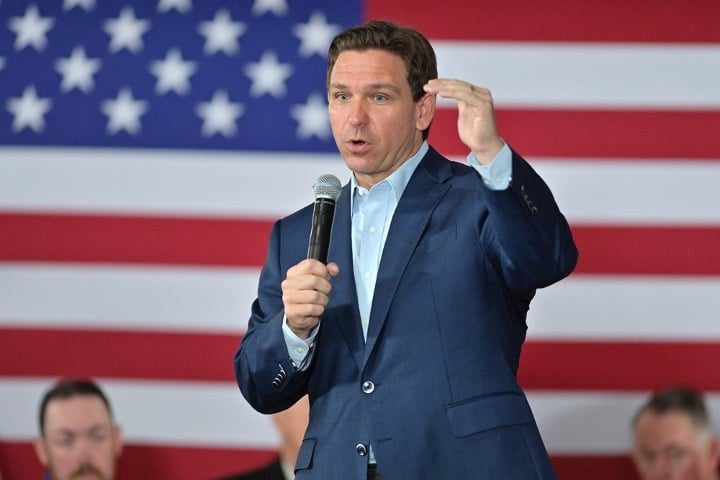
Trailing former President Donald Trump badly in the contest for the Republican Party presidential nomination, Governor Ron DeSantis of Florida told Fox News’ Martha MacCallum on Wednesday that he would push for Congress to eliminate four federal agencies or departments, if elected president next year.
“We would do Education, we would do Commerce, we’d do Energy, and we would do IRS,” DeSantis told MacCallum. “If Congress will work with me on doing that, we’ll be able to reduce the size and scope of government. If Congress won’t go that far, I’m going to use those agencies to push back against woke ideology and against the leftism that we see creeping into all institutions of American life.”
For his part, Trump has promised to ditch any federal spending on programs in the schools “pushing critical race theory, gender ideology or other inappropriate racial, sexual or political content onto our children.”
DeSantis is staking out positions to the right of Trump in his bid to win the Republican nomination. In an obvious shot at the former president, DeSantis said, “We need to fundamentally re-constitutionalize the government. We talked about draining the swamp in 2016; that didn’t happen.”
The Florida governor is not the first Republican presidential hopeful to call for eliminating a federal agency or department. In 1980, Ronald Reagan said he would like to eliminate both the Department of Energy and the Department of Education — then-recently created federal departments by Congress at the urging of President Jimmy Carter. Once in office, though, Reagan’s request went nowhere in the Democrat-controlled House of Representatives, and he said little about his proposal after that.
Then, in 2012, Texas Governor Rick Perry said during a Republican presidential candidate debate that he would like to eliminate three federal departments. When asked which three he would like to axe, Perry named two — Commerce and Education — but could not remember the third.
With Perry struggling to remember the third department, another debate participant, Representative Ron Paul, also of Texas, suggested that it would be good to eliminate five departments, and asked if Perry’s third agency was the Environmental Protection Agency.
Whereupon Perry said, “EPA. There you go.”
But then the CNBC debate moderator asked, “Seriously — is EPA one you are talking about?”
Perry conceded that he was not thinking about EPA, saying rather that that agency needed to be “rebuilt.”
Fifteen minutes later, Perry remembered that the Department of Energy was the third agency he would like to see gone. Later, a Perry spokesman defended his boss, arguing that the governor was still able to name two more federal agencies to get rid of than President Barack Obama had proposed.
It is highly unlikely that DeSantis will forget his four, however. He has frequently called for ditching the Internal Revenue Service (IRS), which he has called a “corrupt organization.” After the passage of the 16th Amendment, which allowed Congress to place a tax on personal income, the IRS was tasked with collecting the tax.
When Congress used its new power to enact a federal income tax, with the Underwood-Simmons bill, assurances were made that the tax would remain in the two- to six-percent range, and would be paid by only the wealthiest of Americans. One member of Congress challenged that assertion, declaring that the tax would probably reach as high as ten percent!
If only.
The first four presidents after the income tax was enacted do not appear to have used the IRS as a weapon against political enemies, but starting with President Franklin Roosevelt, selective enforcement of the income tax laws became common. While President Harry Truman and President Dwight Eisenhower do not appear to have done so, during the administrations of the next three presidents — John Kennedy, Lyndon Johnson, and Richard Nixon — individuals do appear to have been selectively targeted.
After Watergate, presidents such as Gerald Ford, Jimmy Carter, Ronald Reagan, and George H.W. Bush appear to have backed off of such political use of the IRS, but such tactics returned under President Barack Obama, when conservative groups such as the Tea Party were put in the crosshairs of the agency. This illustrates a very important principle — whatever power you give to one president, even if that president does not abuse such power, is also handed over to all future presidents.
Of course, the problem is the 16th Amendment itself. Not only has it been used to target political enemies of current presidential administrations, but it altered the structure of federalism carefully crafted by the framers of the Constitution. Its use has given the federal government much more money than it had previously under the tariff and excise taxes, and made the creation of the modern welfare-warfare state possible. Congress is able to essentially bribe state legislatures into doing their will. For example, when Congress passed a national speed limit of 55 miles per hour, they had no constitutional authority to enforce such a requirement on the states. But when Congress threatened to withhold “federal” highway funds from any state that did not comply, all 50 states meekly went along. Multiple other examples could be given.
DeSantis recently said, “We need something totally different.” When commentator Dana Loesch asked him how he would replace the existing tax structure, he suggested a “single-rate” proposal. “I would be welcoming to take this tax system, chuck it out the window and do something that’s more favorable to the average folks.”
While the flat-tax proposal would be an improvement over what we have now, other proposals, such as the “Fair Tax” — a national sales tax — would be better in protecting the privacy of Americans, and would eliminate the ability of the IRS to use audits to go after political opponents. Of course, if that were to happen, it would be imperative to repeal the 16th Amendment first, as we do not want just another tax on top of the present income tax.
If Congress were to simply restrict its spending to the powers granted it under the U.S. Constitution, federal taxation — whatever system is used — could be dramatically reduced.
And personal liberty could be greatly enhanced.



